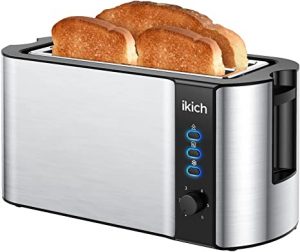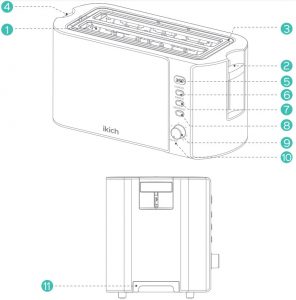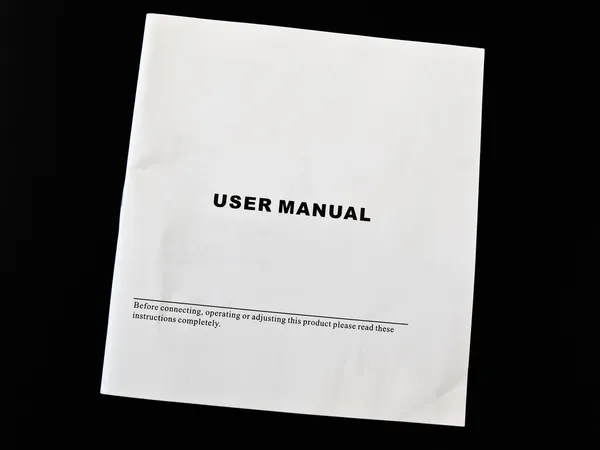ikich TOASTER CP144B User Manual Model: CP144B
Model: CP144B
Important Safety Information
Follow basic safety precautions, including:
- This appliance can be used by children aged from 8 years and above and persons with reduced physical, sensory or mental capabilities or lack of experience and knowledge if they have been supervised instructed and understand the hazards involved.
- Cleaning and user maintenance shall not be done by children unless they are older than 8 and supervised.
- Children shall not play with the appliance.
- Keep the appliance and cable out of reach of children under 8.
- Bread may burn therefore do not use the appliance near or below combustible materials such as curtains. Never use the appliance below wall cupboards or shelves.
- Do not leave the appliance unattended while it is in use.
- The surfaces of the appliance will get hot.
- Remove and empty the crumb tray regularly. Wipe with a damp cloth, dry, then replace in the toaster.
- If the cable is damaged, please contact ikich customerafter-sale service. Email: [email protected].
- This appliance is intended to be used in household and similar applications such as: staff kitchen areas in shops, offices and other working environments; by clients in hotels, motels and other residential type environments; bed and breakfast type environments; farm houses.
- Do not use this appliance near bathtubs, showers, basins or other vessels containing water
- Don’t toast or reheat bread that is too thick, buttered, torn, or misshapen.
- Take extra care when toasting items that contain sugar, jam, seeds, currants, etc. These can melt or drop into the toaster and cause overheating or fire
- If bread gets jammed, unplug the toaster, let it cool, and carefully remove the bread.
- Never use a knife, fork or any other implement to remove jammed bread. As well as potentially damaging the toaster, there is a risk of electric shock!
Diagram

- Toasting Slots
- Carriage Lever
- Warming Rack
- Warming Rack Lever
- LED Display
- Cancel Button
- Single Button
- Defrost Button
- Browning Control
- Reheat
- Crumb Tray
Before First Use
- Remove all packaging from inside the toasting slots.
- Set the browning level to maximum, operate your toaster without any bread in it. Recommend to repeat this operation for 2~3 times to remove the slight odor.Tips: The slight odor is normal and not a course for concern. Ensure the room is well ventilated.
Toasting
Toasting involves exposing bread to a controlled heat, which causes a chemical reaction called the “Maillard Reaction’. This doesn’t just brown the bread, but alters the flavor and texture, which is why toast tastes so good!Since toasting is a combination of drying then cooking the bread, it is affected by various factors such as differences in the bread’s thickness, freshness and surface texture.
Browning Control
The browning control regulates how much the bread is toasted-in other words, the color of the toast. Lower settings produce lighter toast and higher settings produce darker toast.When setting the browning control, remember that dry or thin slices of bread will toast quicker and require a lower setting. Moist or thick slices of bread will require a higher setting.
The toasting process can be stopped at any time by pressing the cancel button.
High Lift Feature

The high lift feature uses the lever to help you to remove the toast. When toasting has finished, simply lift the lever upwards from its rest position to raise the toast and make it easier to remove.
Toasting Bread
- Set the toaster upright on a firm, level, and heat-resistant surface.
- Put the plug into the power socket.
- Turn the browning control to the required setting (1 = light, 6 = dark,please refer to the shade setting card).
- Put bread into the toasting slots. Recommend to place the bread in the middle of the slot. (Maximum thickness: 1.14in/29mm).
- Press the lever down fully. It won’t lock down unless the toaster is connected to the electricity supply.
- The LED display will show the selected browning setting and countdown of toasting.
- When the LED displays “0”, the toast will pop up.
- To stop toasting, press the cancel button.
Tips: The toasting time may be affected by the temperature of the toaster. For example, when you repeat toasting, the countdown time on the LED display will be shorter than the first toasting.
Defrost Function
- Leave the browning control at your favored setting, insert the frozen bread, lower the lever, then press the defrost button.
- The light will come on, and the toasting time will be altered automatically to give the same degree of browning you get with unfrozen bread.
- The LED display will show the selected browning setting and countdown of toasting.
- When the LED displays “0”, the toast will pop up.
Single Slot Toasting
If you are toasting a single slice or two slices of bread, choose the single slot function. By using the single slot function when toasting in one single slot, it will not be over toasted.
- Leave the browning control at your favored setting, insert a single slice of bread, and lower the lever, then press the single button.
- The light will come on, and the LED display will show selected browning setting and countdown of toasting.
- When the LED displays “0”, the toast will pop up.
Tips: When you are using the single slot function, the heating wire in the middle will go out in advance, which helps to prevent over-toasting.
Reheating Toast
The reheat function will heat up toast that has cooled or gone cold.
- Put bread into the toasting slots.
- Set the browning control to reheat, lower the lever.
- The LED display will show the selected browning setting and countdown of toasting.
- When the LED displays “0”, the toast will pop up.
Warming Rack
Note: Do not use the warming rack to warm frozen, buttered, coated, iced, or filled buns.
- Lift up the warming rack.
- Place the buns on top of the warming rack.
- Set the browning level at your favored setting. Then lower the lever.
- When the lever pops up, remove the warmed buns.
- Don’t touch the warming rack wires – they’ll be hot.
- Lift down the warming rack when not in use.
Crumb Removal
It is important that crumbs are not allowed to build up inside your toaster. Excess crumbs are unhygienic and could catch fire. Crumbs can be removed by sliding the crumb tray out from the bottom of your toaster. You can then tip the crumbs out. Always make sure that your toaster has completely cooled down and is disconnected from the mains supply before removing crumbs. Never use your toaster without the crumb tray fitted-always replace the crumb tray before using your toaster.

Clean and Maintenance
- Unplug the appliance and let it cool.
- Wipe outer surfaces with a damp cloth.
- Please clean the crumb tray after each use.
- If there is small crumb left or big crumb stuck inside the toaster, please turn the toaster upside down and shake gently. Never use a hard or sharp object to touch internal parts of the toaster, otherwise, it may damage the toaster or cause safety risks.
- Never use harsh, abrasive or caustic cleaners.
- Never immerse the toaster or power cord and plug in water or any other liquid.
- Always switch off, unplug and allow to cool before moving, cleaning or storing.
Safety Warnings
- This appliance is not intended for use by persons (including children) with reduced physical, sensory or mental capabilities, or lack of experience and knowledge, unless they have been given supervision or instruction concerning use of the appliance by a person responsible for their safety. Children should be supervised to ensure that they do not play with the appliance.
- type Y attachment: If the supply cord is damaged, it must be replaced by the manufacturer, its service agent or similarly qualified persons in order to avoid a hazard.
- CAUTION: In order to avoid a hazard due to inadvertent resetting of the thermal cut-out, this appliance must not be supplied through an external switching device, such as a timer, or connected to a circuit that is regularly switched on and off by the utility.
- This appliance can be used by children aged from 8 years and above and persons with reduced physical, sensory or mental capabilities or lack of experience and knowledge if they have been given supervision or instruction concerning use of the appliance in a safe way and understand the hazards involved. Children shall not play with the appliance. Cleaning and user maintenance shall not be made by children without supervision. Keep the appliance and its cord out of reach of children less than 8 years.
- The appliances are not intended to be operated by means of an external timer or separate remote-control system.
- This appliance is intended to be used in household and similar applications such as:
- staff kitchen areas in shops, offices and other working environments;
- farm houses;
- by clients in hotels, motels and other residential type environments;
- bed and breakfast type environments.
- The door or the outer surface may get hot when the appliance is operating.
FCC Statements
Any Changes or modifications not expressly approved by the party responsible for compliance could void the user’s authority to operate the equipment.This device complies with part 15 of the FCC Rules. Operation is subject to the following two conditions:
- This device may not cause harmful interference, and
- this device must accept any interference received, including interference that may cause undesired operation.
Note:This equipment has been tested and found to comply with the limits for a Class B digital device, pursuant to part 15 of the FCC Rules. These limits are designed to provide reasonable protection against harmful interference in a residential installation. This equipment generates uses and can radiate radio frequency energy and, if not installed and used in accordance with the instructions, may cause harmful interference to radio communications. However, there is no guarantee that interference will not occur in a particular installation. If this equipment does cause harmful interference to radio or television reception, which can be determined by turning the equipment off and on, the user is encouraged to try to correct the interference by one or more of the following measures:
- Reorient or relocate the receiving antenna.
- Increase the separation between the equipment and receiver.
- Connect the equipment into an outlet on a circuit different from that to which the receiver is connected.
- Consult the dealer or an experienced radio/TV technician for help.
Cook Smarter, Live Healthier
[xyz-ips snippet=”download-snippet”]

